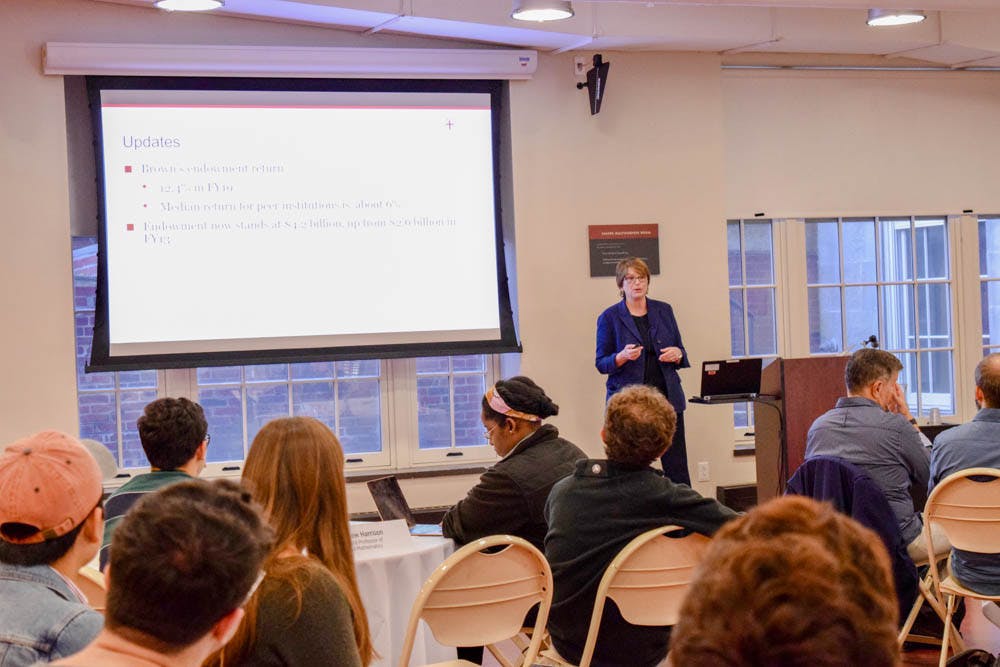The Rhode Island Department of Education will officially take control of the Providence Public School District on Nov. 1, President Christina Paxson P ’19 announced to the community at the Brown University Community Council meeting Oct. 15.
The takeover follows the release of a Johns Hopkins study detailing numerous critical problems pervading PPSD, The Herald previously reported. As part of the takeover, RIDE is now working toward appointing a new PPSD superintendent, and the consulting firm Ernst and Young is running a financial analysis of the district to determine the efficiency of its current allocation of resources, Paxson said.
The University intends to focus its efforts and own role in the takeover of two schools in the district, and will determine the specific schools in coordination with RIDE and PPSD, Paxson said. A steering committee will also be formed to run this “ten-year project,” although Paxson did not provide further details about that committee at the meeting.
When the meeting was opened up for community comments, Seth Rockman, an associate professor of history who is a parent of a PPSD student, repeated a sentiment he regularly shares with faculty and staff members. “You live in Providence, you need to send your kids to PPSD. And when you don’t, you cause harm to our community.”
He also voiced his criticism with the University’s decision to focus resources on specific schools rather than the district as a whole. “I worry about the way in which this creates, effectively, Brown charter schools,” he said.
The University also intends to speak with staff and faculty members like Rockman that are parents of children who attend PPSD schools, although Paxson did not describe what this process would look like or what would be discussed.
The Annenberg Institute will work to better inform the PPSD’s decision-making process by researching issues selected by the district, RIDE and other local partners, said Ellen Viruleg, managing director of the Annenberg Institute, at the BUCC meeting. When a research center hopes to aid a community, it is important to prioritize “following the lead of your (community) partners,” Viruleg added.
Betsy Shimberg, director of student development at the Swearer Center, highlighted the center’s current programs in PPSD, such as the Brown Elementary Afterschool Mentoring program. BEAM has shown considerable success at William D’Abate Elementary School, where students who participated in the program demonstrated significantly higher scores on math and reading exams than non-participating students, as well as higher attendance percentages, Shimberg said.
In conversation with Rhode Island Education Commissioner Angélica Infante-Green, the University has already announced its plan to create programs for teachers’ professional development, The Herald previously reported. Additionally, they hope to strengthen student tutoring and resources like school libraries at the two yet-unidentified schools, Paxson said.
The University also seeks to increase college access pathways for PPSD students by collaborating with the Community College of Rhode Island, The Herald previously reported.
At the meeting, Paxson also outlined the University’s gift acceptance policy, stating that the University intends to make the policy more transparent and accessible to the public. The University recently announced it would be redirecting gifts made by the Sackler family’s foundation, La Fondation Sackler, The Herald previously reported.
Paxson also addressed the controversy surrounding reports that Massachusetts Institute of Technology had secretly accepted gifts from Jeffrey Epstein.“We would never use anonymity as a shield” for a donor, she said. The University’s acceptance of a gift “does not imply nor mean that the University endorses … the donor’s views, opinions, businesses, or activities,” according to a slide during her presentation.
Paxson also summarized results from the 2019 AAU Campus Climate Survey on Sexual Assault and Misconduct,, released Oct. 15, on campus sexual assault. She said that while reports of sexual assault had increased slightly, campus awareness of University resources had increased significantly.





